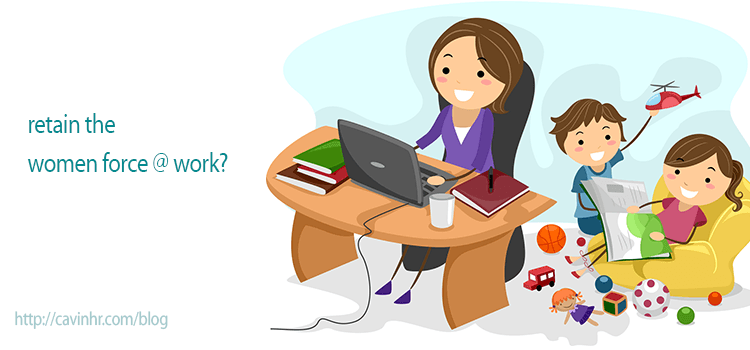Before I answer this question, let me tell you the list of reasons why the women employees leave their resplendent career when they are at the peak of it.
1. Marriage
To begin with, marriage and the inevitable relocation has been a primary reason for women to quit work after marriage. Most companies do not offer the flexibility of telecommuting or work-from-home options. Then comes the job location. Most of information technology and manufacturing job locations are mostly outside the city.
2. Long Distance Commuting
Commuting to the workplace that takes more than an hour each way is yet another reason why women quit their promising careers especially post marriage. After marriage, women are not able to take up jobs that require them to work in odd hours as it becomes difficult to manage work and home.
3. Maternity
Maternity and childbirth is the next major event in a woman’s personal life and this has a huge impact on her professional career too. Getting the required benefits at this point is crucial for women employees. Restricted maternity leave before and after childbirth, lesser paid leave and unpaid leave are some major reasons for women to quit their jobs.
In countries like the US, where the cost of daycare is very high, women do not prefer to leave a small baby in daycare and also the possibility of their children falling sick often are more in daycare when the baby is too small.
Taking care of aging parents and in-laws is also yet another reason why women quit the job as this responsibility predominantly lies in the women of the house.
When we take a very close look at the characteristic traits of these middle-aged women who compromise their career, we find that these women are caught in a catch-22 situation as these women do very well in their professional career, but would also like to spend maximum time after childbirth to nourish the baby. The resolution invariably is at the cost of their career and the employer loses a skilled employee. In some cases, the employee ends up affecting her health trying to be the best at both the ends and ultimately burn out and quit their career for good. Is it really good for our economy to lose out such a talented workforce? One option could be to opt for a part-time job, but there are very limited well-paying part-time jobs and even they do not offer a career growth even at a slow pace.
In the United States, Congress passed a law in 1993 giving employees 12 weeks of family leave. That was the last major piece of family-friendly federal legislation. But many European countries, which have long had paid parental leave, have expanded such policies since 1990. They have also expanded subsidized child care and passed laws giving workers the right to demand a part-time schedule and prohibiting employers from discriminating against part-time workers. These policies have been crucial for retaining mothers in the labor force.
I listed all possible reasons why women quit a job and are not able to find a suitable re-entry to career again, now we have one organization that has taken a very positive step towards women’s maternity package.
Online retail company Flipkart has announced a range of perks for women employees to attract more women professionals to the job. It claims to offer 6 months of paid maternity leave as against the government mandated 3 months leave offered by most companies. They are also giving 4 months of flexible working with pay for new mothers. Apart from that, woman employees can take up to one year of extended maternity leave without pay and still remain in the company rolls and can return to jobs available at that point. They can avail transport reimbursement of Rs. 600 per day during their last 2 months of pregnancy and will have a reserved parking lot for two months before and after delivery. Above all this, the most attractive clause offered by Flipkart is that they have offered to pay 50% of daycare at high standard facilities for the first 4 years of the child’s life. Right now there are no women on Flipkart’s board of directors, but this is sure to change as this attractive package announced by Flipkart which addresses almost all the issues that I have listed at the beginning of this blog, will attract more talented women workforce to the leadership roles.
There is also another company which has announced a positive step in this direction – Vodafone. By the end of 2015, they will be introducing a worldwide maternity policy, offering significantly better terms than the statutory minimum in many countries where it operates. As per the policy women will get a minimum of 16 weeks of fully-paid maternity leave. New mothers returning to work need not work 40 hours per week. Instead, they could work 30-hour weeks on full pay for 6 months. The main motive behind this policy is to recruit and retain the really powerful women force.
The wide-ranging thought of all these organizational giants is that the cost of recruiting and training new employees is much higher than offering such attractive beneficial maternity packages to the deserving, talented existing women force. If better maternity benefits are given women will not quit jobs even after childbirth and it will help retain the best resources at work. Will more and more companies start looking into the standard set by organizations like Flipkart and Vodafone?
What maternity leave benefits does your company offer? Do you think this is beneficial to the company in the long run? Looking forward to your views in the comments section.

Leave A Comment